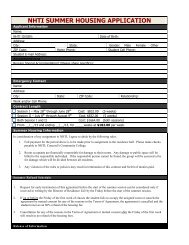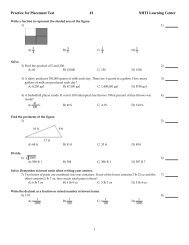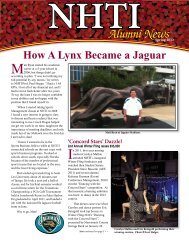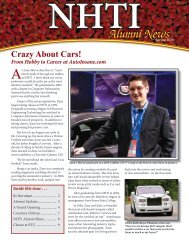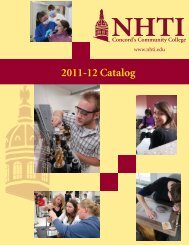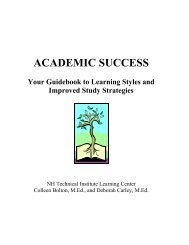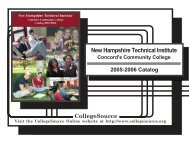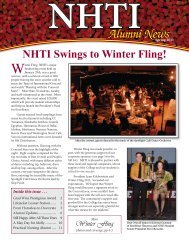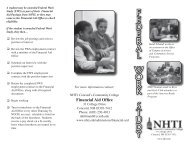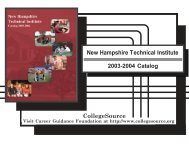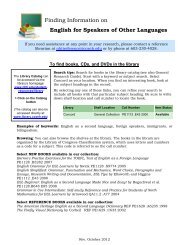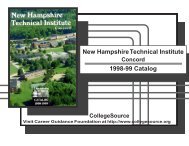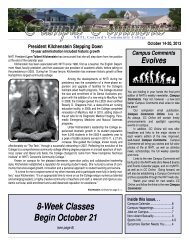Course Descriptions 11-12 - NHTI - Concord's Community College
Course Descriptions 11-12 - NHTI - Concord's Community College
Course Descriptions 11-12 - NHTI - Concord's Community College
- No tags were found...
You also want an ePaper? Increase the reach of your titles
YUMPU automatically turns print PDFs into web optimized ePapers that Google loves.
knowledge, proofreading and editing skills, referencing, andmachine operation will be required to meet increasedaccuracy and productivity standards. Includes enhancingtranscription skills with regard to interpretation of foreigndictations and difficult dictations, and processing work withquestionable meanings. Includes introduction to difficultoperative and laboratory dictation processing as well asmedicolegal implications and responsibilities related toconfidentiality and the patient record, ethics, and the level ofprofessionalism to be maintained in the business institution.(Prerequisite: MN 101 or permission of instructor)MN 290 Medical Transcription Internship 0-9-3The internship offers the opportunity to put learned theoryto practical application in a supervised work environment.Students are required to obtain their own internship siteand, once the site is approved by the program coordinator,to complete a minimum of 90 hours with that internship site.Periodic conferences between the site supervisor and the<strong>NHTI</strong> internship/program coordinator and the student will bescheduled to monitor and evaluate student progress. Thiscourse is limited to seniors and requires the approval of theDepartment Head. (Prerequisite: MN 101 and MN 202 with acombined GPA of 3.0 in the two courses and approval of theMedical Transcription program coordinator)Mental HealthMH 187 The Helping Relationship: InterpersonalCommunication Skills for Today's Professional 4-0-4Knowledge, skills and personal characteristics that areneeded in today's professional world of helping careers willbe examined. Students will learn the purpose and skill ofinterpersonal communication techniques through variousdidactic and experiential methods. Coverage will includedocumentation and verbal and non-verbal communications,along with time management, self management andsuccessful work practices. Dynamics of human behavior,culture and specific needs seen in the workplace will beexplored.MH 195 Mental Health Practicum I* 2-8-4The student will work in an approved mental health settingunder the supervision of an approved professional. Periodicconferences between the Supervisor and PracticumCoordinator are planned in order to evaluate the student'sprogress. At the close of the semester, the student willsubmit documentation of the practicum activities/experienceand demonstrate the ability to relate theory to practice inthe chosen field of experience. The student will complete atotal of <strong>12</strong>5 hours of field experience. (Prerequisites: HU 104,HU <strong>11</strong>1, HU 221 and MH 187)MH 298 Mental Health Practicum II* 2-8-4The student will continue their field experience work in anapproved mental health setting under the supervision of anapproved professional. Skills, knowledge and personalcharacteristics are built upon and integrated into the learningand supervision of this course, as well as second yearcoursework including ethics, individual counseling andconflict resolution. Periodic conferences between theSupervisor and Practicum Coordinator are planned in orderto evaluate the student's progress. At the close of thesemester, the student will submit documentation of thepracticum activities/experience and demonstrate the abilityto relate theory to practice in the chosen field of experience.The student will complete a total of <strong>12</strong>5 hours of fieldexperience. (Prerequisites: HU 104, HU <strong>11</strong>1, HU 221, HU 242,MH 187 and MH 193)* The student will also complete an interview with thepracticum coordinator the semester prior to the firstscheduled practicum. Special requests regarding practicumentrance may be brought to the department head by thestudent. Review of the requests will be made by thedepartment faculty and special exemptions may be madefor entrance into the practicum.Nursing (RN)All nursing courses integrate theory and clinical experience.Failure to receive a satisfactory grade in either theory OR theclinical experience portion of the course will result in a failinggrade. All nursing major field courses must be passed beforeproceeding to the next level. A grade of "C" or higher isrequired in BI 195, BI 196 and BI 202, and math elective, MT<strong>12</strong>9, or MT <strong>12</strong>4 or MT <strong>12</strong>5 or MT 251, to enter or progress inthe nursing courses.NU <strong>11</strong>5 Nursing I 5-10-8Nursing I introduces the student to the role of the associatedegree nurse and the basic concepts of nursing practice,including the nursing process, within the Self-CareFramework. The emphasis of the course is on assessment ofuniversal self-care requirements which include air, water,activity and rest, elimination, solitude/social interaction, andfood. Maintaining normalcy and avoiding hazards will beaddressed within each Universal Self-Care Requirement. Theconcept of caring and ethical/legal standards of nursingpractice are explored. The student, usingeducative/supportive and partially compensatory nursingsystems, cares for clients with reversible deficits.Opportunities for application of knowledge to clinicalpractice are provided through laboratory experiences andclient care assignments in various settings. Evaluation ofknowledge occurs throughout the course with interactionbetween student and faculty to facilitate learning. Clinicalsites are in medical/surgical settings. (Corequisite: BI 195,EN 101, and PY 105)NU <strong>11</strong>6 Nursing IIA 6-15-<strong>11</strong>The emphasis of Nursing IIA is on the assessment ofdevelopmental self-care requirements which maintainconditions that support growth and development over thelife cycle. Common health deviations that affect growth anddevelopment over the life cycle are presented. The studentapplies the concept of caring and ethical/legal standards tothe care of the client and support persons. The student usesall nursing systems with a focus on the educative/supportiveand partially compensatory nursing systems to assist clientsand their support persons experiencing various life cycleevents. Planned learning experiences provide the studentwith the opportunity to interrelate social, interpersonal,environmental and technological concepts in the care of8/17/20<strong>11</strong> <strong>NHTI</strong>, Concord’s <strong>Community</strong> <strong>College</strong> <strong>Course</strong> <strong>Descriptions</strong> 20<strong>11</strong>-20<strong>12</strong> 44



